Text
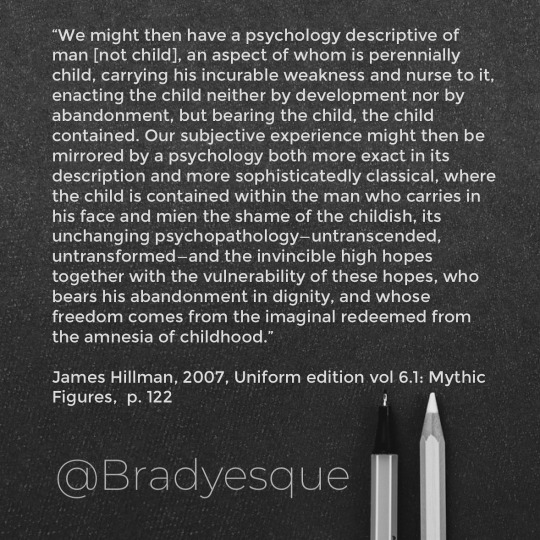
A closing thought on inner child work that doesn’t reduce or prioritize or overvalue the child as archetype; allowing without abandoning from or abandoning into, in Hillman’s own words:
“We might then have a psychology descriptive of man [not child], an aspect of whom is perennially child, carrying his incurable weakness and nurse to it, enacting the child neither by development nor by abandonment, but bearing the child, the child contained. Our subjective experience might then be mirrored by a psychology both more exact in its description and more sophisticatedly classical, where the child is contained within the man who carries in his face and mien the shame of the childish, its unchanging psychopathology—untranscended, untransformed—and the invincible high hopes together with the vulnerability of these hopes, who bears his abandonment in dignity, and whose freedom comes from the imaginal redeemed from the amnesia of childhood.”
James Hillman, 2007, Uniform edition vol 6.1: Mythic Figures, p. 122
#Psychology #Psychologist #Therapy #Therapist #Counseling #Counselor #Psychoanalysis #Psychoanalyst #LongBeach #California #PrivatePractice #Intimacy #Boundaries #Idenity #Quote
0 notes
Photo
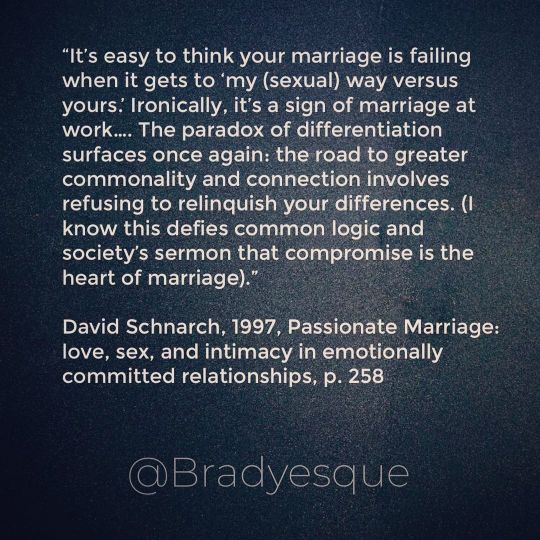
As an analytical aside, I rarely see mutual compromise in couples. Usually it is one person leveraging their “boundaries,” in an attempt to control another, and the other person compromising, not realizing that being the only one compromising, they are in fact resigning. And yet, properly having conflict rather than bypassing conflict in tidy solutions does a tremendous amount of good for the growth and development of all parties in a marriage. Or as David Schnarch would accurately note: “It’s easy to think your marriage is failing when it gets to ‘my (sexual) way versus yours.’ Ironically, it’s a sign of marriage at work…. The paradox of differentiation surfaces once again: the road to greater commonality and connection involves refusing to relinquish your differences. (I know this defies common logic and society’s sermon that compromise is the heart of marriage).” David Schnarch, 1997, Passionate Marriage: love, sex, and intimacy in emotionally committed relationships, p. 258 #Psychology #Psychologist #Therapy #Therapist #Counseling #Counselor #Psychoanalysis #Psychoanalyst #LongBeach #California #PrivatePractice #Sex #Intimacy #Boundaries #Quote (at Bradyesque) https://www.instagram.com/p/CqbPcWAvJcQ/?igshid=NGJjMDIxMWI=
#psychology#psychologist#therapy#therapist#counseling#counselor#psychoanalysis#psychoanalyst#longbeach#california#privatepractice#sex#intimacy#boundaries#quote
0 notes
Photo
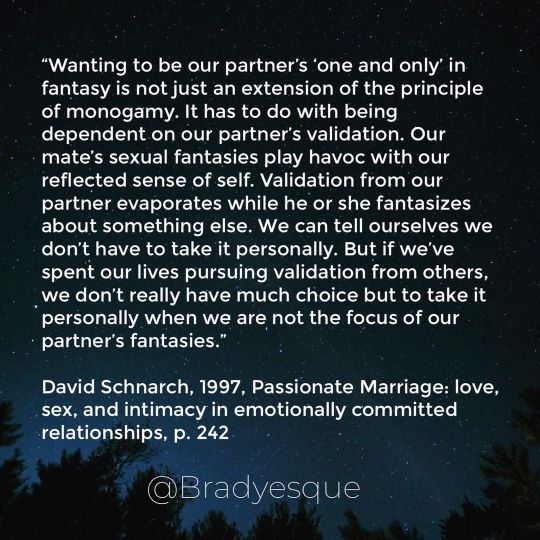
I’ve had many patients tell me, in the very same breath, that they are secure in their relationship yet they are deeply angry whenever they are not the absolute center of their partners every thought or action. The self diagnosed problem, as many have argued on my couches, is their partner’s lack of devotion or lack of love, not their own unending desire for validation. And this presents across many domains, but especially in the erotic. To feel absolutely worthless when one isn’t the absolute center of another’s fantasies… or as David Schnarch would compassionately acknowledge too: “Wanting to be our partner’s ‘one and only’ in fantasy is not just an extension of the principle of monogamy. It has to do with being dependent on our partner’s validation. Our mate’s sexual fantasies play havoc with our reflected sense of self. Validation from our partner evaporates while he or she fantasizes about something else. We can tell ourselves we don’t have to take it personally. But if we’ve spent our lives pursuing validation from others, we don’t really have much choice but to take it personally when we are not the focus of our partner’s fantasies.” David Schnarch, 1997, Passionate Marriage: love, sex, and intimacy in emotionally committed relationships, p. 242 #Psychology #Psychologist #Therapy #Therapist #Counseling #Counselor #Psychoanalysis #Psychoanalyst #LongBeach #California #PrivatePractice #Sex #Intimacy #Boundaries #Quote (at Bradyesque) https://www.instagram.com/p/CqJMgToPlpX/?igshid=NGJjMDIxMWI=
#psychology#psychologist#therapy#therapist#counseling#counselor#psychoanalysis#psychoanalyst#longbeach#california#privatepractice#sex#intimacy#boundaries#quote
0 notes
Photo
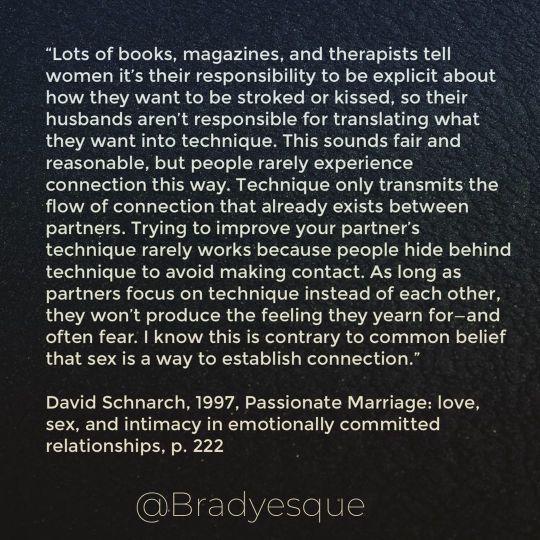
Presented with one additional comment: this is applicable to more than cisgender heterosexual monogamously married couples. “Lots of books, magazines, and therapists tell women it’s their responsibility to be explicit about how they want to be stroked or kissed, so their husbands aren’t responsible for translating what they want into technique. This sounds fair and reasonable, but people rarely experience connection this way. Technique only transmits the flow of connection that already exists between partners. Trying to improve your partner’s technique rarely works because people hide behind technique to avoid making contact. As long as partners focus on technique instead of each other, they won’t produce the feeling they yearn for—and often fear. I know this is contrary to common belief that sex is a way to establish connection.” David Schnarch, 1997, Passionate Marriage: love, sex, and intimacy in emotionally committed relationships, p. 222 #Psychology #Psychologist #Therapy #Therapist #Counseling #Counselor #Psychoanalysis #Psychoanalyst #LongBeach #California #PrivatePractice #Sex #Intimacy #Boundaries #Quote (at Bradyesque) https://www.instagram.com/p/Cp3HsbhPFu0/?igshid=NGJjMDIxMWI=
#psychology#psychologist#therapy#therapist#counseling#counselor#psychoanalysis#psychoanalyst#longbeach#california#privatepractice#sex#intimacy#boundaries#quote
0 notes
Photo

Several times this week I’ve had careful clinical sessions with patients curious for tips and tricks to spice things up in the bedroom. Unironically, the desire for tips and tricks makes one a better technician, but bypasses soo much of what is important in those moments: being present in the direct expression of want, showing the motivation for passion in the context of the present relationship, naming the particular craving in ones own actions, and following through on that want. Or as Schnarch puts it far more succinctly… starting with where it begins: “Foreplay is important because it’s inevitable. Foreplay always occurs. Whether gentle or rough, extended or momentary, foreplay is a fact. Foreplay is the conscious and unconscious negotiation process that sets the emotional tone and meaning for the remainder of the encounter. Once established, it’s often difficult to change in a particular sexual exchange and resistant to change in successive encounters in a ongoing relationship too…. The sameness of meaning—and not simply the same behaviors—gives marital sex its boring, repetitive quality.” David Schnarch, 1997, Passionate Marriage: love, sex, and intimacy in emotionally committed relationships, p. 190 #Psychology #Psychologist #Therapy #Therapist #Counseling #Counselor #Psychoanalysis #Psychoanalyst #LongBeach #California #PrivatePractice #Sex #Intimacy #Boundaries #Quote (at Bradyesque) https://www.instagram.com/p/CplNKSqyT0v/?igshid=NGJjMDIxMWI=
#psychology#psychologist#therapy#therapist#counseling#counselor#psychoanalysis#psychoanalyst#longbeach#california#privatepractice#sex#intimacy#boundaries#quote
0 notes
Photo

Thrice this week I have reminded people that their own guardedness, their own defensiveness, their own hypervigilance, or their insatiable desire for safety, can often lead to more conflict and more hostile interactions overall. And yet, the impenetrable paradox remains: one only feels safe with armor on, yet needs to feel safe to take armor off, only to put armor on again to feel safe. David Schnarch wisely notes this: “When you are constantly clanking around in your emotional armor, you are a sitting duck for anyone who wants a fight. You can’t move quickly because you are stressed out all the time. You keep your radar going full strength, but you can’t see anything new. Being tense offers little protection, increases your vulnerability, gives a false sense of security, and increases your reactivity.” David Schnarch, 1997, Passionate Marriage: love, sex, and intimacy in emotionally committed relationships, p. 169 #Psychology #Psychologist #Therapy #Therapist #Counseling #Counselor #Psychoanalysis #Psychoanalyst #LongBeach #California #PrivatePractice #Sex #Intimacy #Boundaries #Quote (at Bradyesque) https://www.instagram.com/p/CpTQUUryEr-/?igshid=NGJjMDIxMWI=
#psychology#psychologist#therapy#therapist#counseling#counselor#psychoanalysis#psychoanalyst#longbeach#california#privatepractice#sex#intimacy#boundaries#quote
0 notes
Photo
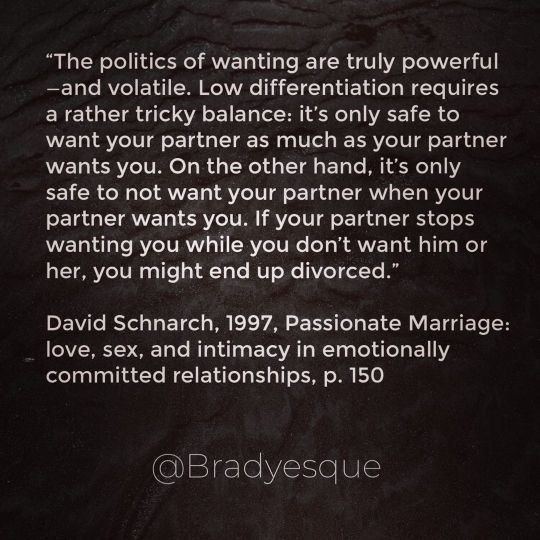
There is a common power struggle that exists within the undifferentiated concept of vulnerability; that another is responsible for someone to feel safe so that they can be vulnerable. And there is little else more vulnerable that wanting. When it comes down to the concrete level of wanting a partner, at that very relational level, waiting to want only when another wants, wanting reassurance that it is okay to want, or assuming that another’s wants are more fixed, are all problematic pitfalls. Or as David Schnarch gently notes: “The politics of wanting are truly powerful—and volatile. Low differentiation requires a rather tricky balance: it’s only safe to want your partner as much as your partner wants you. On the other hand, it’s only safe to not want your partner when your partner wants you. If your partner stops wanting you while you don’t want him or her, you might end up divorced.” David Schnarch, 1997, Passionate Marriage: love, sex, and intimacy in emotionally committed relationships, p. 150 #Psychology #Psychologist #Therapy #Therapist #Counseling #Counselor #Psychoanalysis #Psychoanalyst #LongBeach #California #PrivatePractice #Sex #Intimacy #Boundaries #Quote (at Bradyesque) https://www.instagram.com/p/CpBeWA_PlSm/?igshid=NGJjMDIxMWI=
#psychology#psychologist#therapy#therapist#counseling#counselor#psychoanalysis#psychoanalyst#longbeach#california#privatepractice#sex#intimacy#boundaries#quote
0 notes
Photo
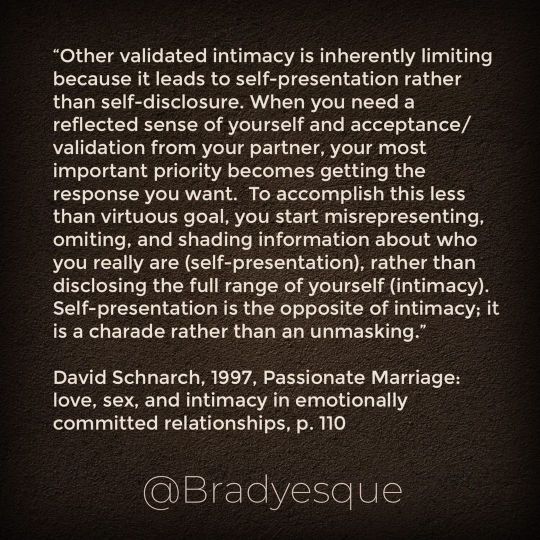
There are perhaps hundreds if not thousands of personal rationales that I’ve heard over the years as to why a person would misrepresent themself in close relationships or even publicly. And most of those rationales that I’ve heard have been messy; messy in the sense that it isn’t easily discernible what the misrepresentation is truly hiding, if anything. With this, sometimes a person doesn’t know what’s behind a mask except the deep desire to wear a mask. Or as David Schnarch clearly would note: “Other validated intimacy is inherently limiting because it leads to self-presentation rather than self-disclosure. When you need a reflected sense of yourself and acceptance/validation from your partner, your most important priority becomes getting the response you want. To accomplish this less than virtuous goal, you start misrepresenting, omiting, and shading information about who you really are (self-presentation), rather than disclosing the full range of yourself (intimacy). Self-presentation is the opposite of intimacy; it is a charade rather than an unmasking.” David Schnarch, 1997, Passionate Marriage: love, sex, and intimacy in emotionally committed relationships, p. 110 #Psychology #Psychologist #Therapy #Therapist #Counseling #Counselor #Psychoanalysis #Psychoanalyst #LongBeach #California #PrivatePractice #Sex #Intimacy #Boundaries #Quote (at Bradyesque) https://www.instagram.com/p/CovLrFgS1jT/?igshid=NGJjMDIxMWI=
#psychology#psychologist#therapy#therapist#counseling#counselor#psychoanalysis#psychoanalyst#longbeach#california#privatepractice#sex#intimacy#boundaries#quote
0 notes
Photo
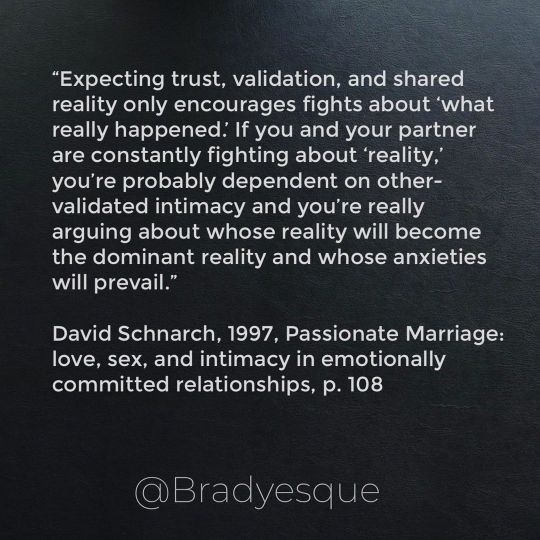
In a bit of an unexpected way, I’ve yet to encounter a couple in my practice that was highly enmeshed that didn’t have regular accusations of gaslighting and manipulation. Routine arguments about whose version of an event is real, and how there is only one version of reality, and how any difference in the presumably singular narrative is proof of manipulation or gaslighting or that someone must be a narcissist because they aren’t endlessly validating… are all too common for highly undifferentiated individuals and relationships. Or as David Schnarch would note: “Expecting trust, validation, and shared reality only encourages fights about ‘what really happened.’ If you and your partner are constantly fighting about ‘reality,’ you’re probably dependent on other-validated intimacy and you’re really arguing about whose reality will become the dominant reality and whose anxieties will prevail.” David Schnarch, 1997, Passionate Marriage: love, sex, and intimacy in emotionally committed relationships, p. 108 #Psychology #Psychologist #Therapy #Therapist #Counseling #Counselor #Psychoanalysis #Psychoanalyst #LongBeach #California #PrivatePractice #Sex #Intimacy #Boundaries #Quote (at Bradyesque) https://www.instagram.com/p/CodE9nAST_g/?igshid=NGJjMDIxMWI=
#psychology#psychologist#therapy#therapist#counseling#counselor#psychoanalysis#psychoanalyst#longbeach#california#privatepractice#sex#intimacy#boundaries#quote
0 notes
Photo

On Monday I did a video on TikTok describing boundaries, specifically how people can, in their idea of boundaries as being firm with what they want, actually demonstrate their codependent beliefs and feelings; thereby holding codependent boundaries. One perfect example of codependent boundaries was written by David Schnarch, and if it sounds “good” to you then there’s more to examine: “Other validated intimacy ‘sounds’ like this: ‘I’ll tell you about myself, but only if you then tell me about yourself. If you don’t, I won’t either. But I want to, so you have to. I’ll go first and then you’ll be obligated to disclose—its only fair. And if I go first, you have to make me feel secure. I need to be able to trust you!” David Schnarch, 1997, Passionate Marriage: love, sex, and intimacy in emotionally committed relationships, p. 107 #Psychology #Psychologist #Therapy #Therapist #Counseling #Counselor #Psychoanalysis #Psychoanalyst #LongBeach #California #PrivatePractice #Sex #Intimacy #Boundaries #Quote (at Bradyesque) https://www.instagram.com/p/CoLELppPigL/?igshid=NGJjMDIxMWI=
#psychology#psychologist#therapy#therapist#counseling#counselor#psychoanalysis#psychoanalyst#longbeach#california#privatepractice#sex#intimacy#boundaries#quote
0 notes
Photo
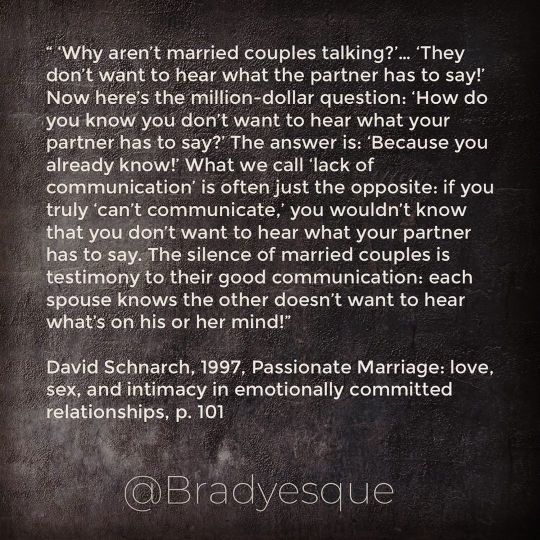
While there are plenty of times when I challenge couples that enact, or expect, mind-reading, there are also plenty of times when something close to that is happening that is altogether legitimate. It’s not exactly mind-reading to have a relational history where, for instance, only one partner is allowed to vocalize complaints and the other partner is the only one held accountable; the one routinely held accountable, the one always in the wrong, receives the “communication” implicitly rather than explicitly, that their problems aren’t worth discussing. It’s communicated, if not explicitly, then perhaps tacitly in the power dynamics. Or as Schnarch can more casually describe: “ ‘Why aren’t married couples talking?’… ‘They don’t want to hear what the partner has to say!’ Now here’s the million-dollar question: ‘How do you know you don’t want to hear what your partner has to say?’ The answer is: ‘Because you already know!’ What we call ‘lack of communication’ is often just the opposite: if you truly ‘can’t communicate,’ you wouldn’t know that you don’t want to hear what your partner has to say. The silence of married couples is testimony to their good communication: each spouse knows the other doesn’t want to hear what’s on his or her mind!” David Schnarch, 1997, Passionate Marriage: love, sex, and intimacy in emotionally committed relationships, p. 101 #Psychology #Psychologist #Therapy #Therapist #Counseling #Counselor #Psychoanalysis #Psychoanalyst #LongBeach #California #PrivatePractice #Sex #Intimacy (at Bradyesque) https://www.instagram.com/p/Cn48ZfzPFyb/?igshid=NGJjMDIxMWI=
#psychology#psychologist#therapy#therapist#counseling#counselor#psychoanalysis#psychoanalyst#longbeach#california#privatepractice#sex#intimacy
0 notes
Photo
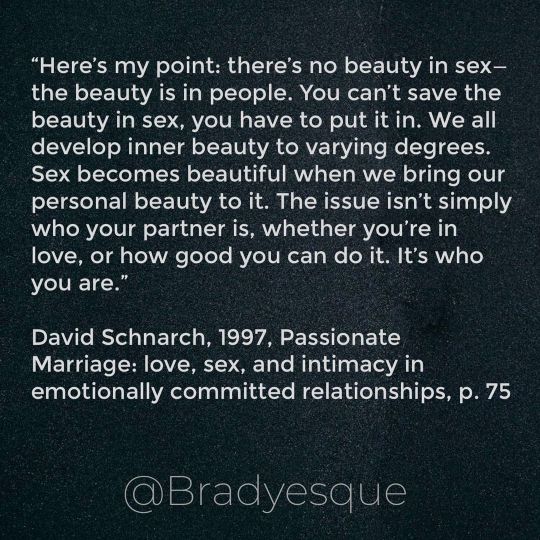
Sometimes working through the ideas and fantasies and beliefs about sex, about romance, and what makes “chemistry” happen is a lot of delicate work. Far too many people I’ve worked with think the “magic” of sex just happens, or is only right if the circumstances are right, or is fully their partners responsibility or fully their own responsibility to be a good partner, and soo many other limiting and disconnected ideas. And yet, for something to be special, it requires an ability to feel something as special, as personal. As Schnarch more poetically notes: “Here’s my point: there’s no beauty in sex—the beauty is in people. You can’t save the beauty in sex, you have to put it in. We all develop inner beauty to varying degrees. Sex becomes beautiful when we bring our personal beauty to it. The issue isn’t simply who your partner is, whether you’re in love, or how good you can do it. It’s who you are.” David Schnarch, 1997, Passionate Marriage: love, sex, and intimacy in emotionally committed relationships, p. 75 #Psychology #Psychologist #Therapy #Therapist #Counseling #Counselor #Psychoanalysis #Psychoanalyst #LongBeach #California #PrivatePractice #Sex #Intimacy (at Bradyesque) https://www.instagram.com/p/Cnm6FauvEYI/?igshid=NGJjMDIxMWI=
#psychology#psychologist#therapy#therapist#counseling#counselor#psychoanalysis#psychoanalyst#longbeach#california#privatepractice#sex#intimacy
0 notes
Photo
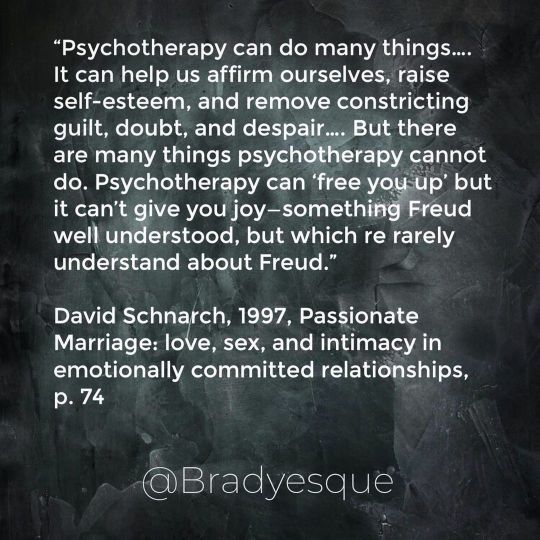
Had more than a few conversations this week with people, heartbroken, yearning to just feel happy. I wish I could blithely evoke that. Instead... its more contemplative conversations about the ways that happiness is sabotaged, moments of joy are disqualified, how effort to build toward fulfillment is abandoned, why someone would hold onto the omnipotent or omniscient wish to know the effort is worth it before taking any risk to be happy. As a casual aside, David Schnarch tossed out his take on Freud: “Psychotherapy can do many things…. It can help us affirm ourselves, raise self-esteem, and remove constricting guilt, doubt, and despair…. But there are many things psychotherapy cannot do. Psychotherapy can ‘free you up’ but it can’t give you joy—something Freud well understood, but which re rarely understand about Freud.” David Schnarch, 1997, Passionate Marriage: love, sex, and intimacy in emotionally committed relationships, p. 74 #Psychology #Psychologist #Therapy #Therapist #Counseling #Counselor #Psychoanalysis #Psychoanalyst #LongBeach #California #PrivatePractice #Sex #Intimacy (at Bradyesque) https://www.instagram.com/p/CnVn_DmLwxo/?igshid=NGJjMDIxMWI=
#psychology#psychologist#therapy#therapist#counseling#counselor#psychoanalysis#psychoanalyst#longbeach#california#privatepractice#sex#intimacy
0 notes
Photo
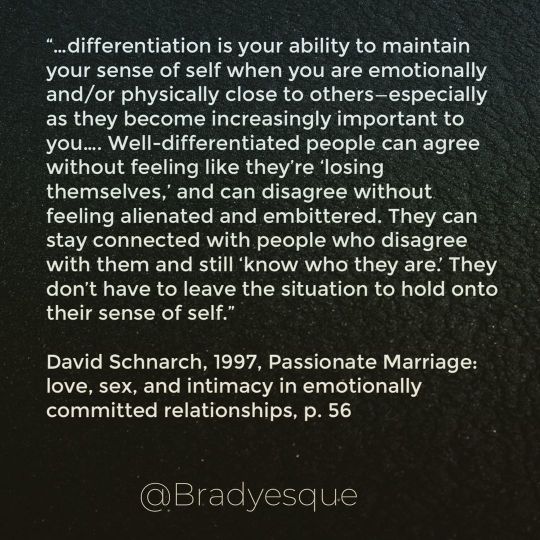
The ability to maintain a sense of self when in relationship, and not make one’s own capacity to be a full person based on another’s receptivity, support, or encouragement is the operational and foundational skill of healthy relationships. It isn’t built prior to relationships, but built within each and every relationship. And yet, far too many people would rather hold onto the fantasy that a good lifelong relationship just is, no red flags, no work involved, just effortless magic. Gently disenchanting the magic, David Schnarch consoles: “…differentiation is your ability to maintain your sense of self when you are emotionally and/or physically close to others—especially as they become increasingly important to you…. Well-differentiated people can agree without feeling like they’re ‘losing themselves,’ and can disagree without feeling alienated and embittered. They can stay connected with people who disagree with them and still ‘know who they are.’ They don’t have to leave the situation to hold onto their sense of self.” David Schnarch, 1997, Passionate Marriage: love, sex, and intimacy in emotionally committed relationships, p. 56 #Psychology #Psychologist #Therapy #Therapist #Counseling #Counselor #Psychoanalysis #Psychoanalyst #LongBeach #California #PrivatePractice #Sex #Intimacy (at Bradyesque) https://www.instagram.com/p/CnDachFPDqk/?igshid=NGJjMDIxMWI=
#psychology#psychologist#therapy#therapist#counseling#counselor#psychoanalysis#psychoanalyst#longbeach#california#privatepractice#sex#intimacy
0 notes
Photo
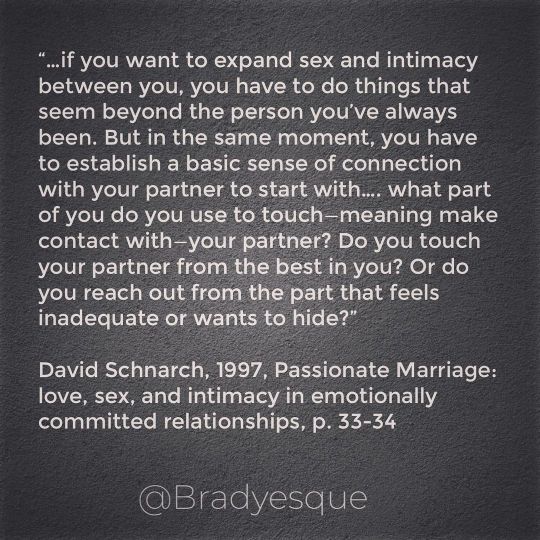
As a therapist that works with various sex and intimacy issues, I see them not so separate from identity and integrity issues at play as well. And yet… the desire to blame one’s partner, or all former partners, or society, or anyone else but oneself for problems, or one’s own wants, or expression of wants… makes a sad sort of sense. Identity and integrity is endlessly part of those conversations. Or as David Schnarch directly asks it: “…if you want to expand sex and intimacy between you, you have to do things that seem beyond the person you’ve always been. But in the same moment, you have to establish a basic sense of connection with your partner to start with…. what part of you do you use to touch—meaning make contact with—your partner? Do you touch your partner from the best in you? Or do you reach out from the part that feels inadequate or wants to hide?” David Schnarch, 1997, Passionate Marriage: love, sex, and intimacy in emotionally committed relationships, p. 33-34 #Psychology #Psychologist #Therapy #Therapist #Counseling #Counselor #Psychoanalysis #Psychoanalyst #LongBeach #California #PrivatePractice #Sex #Intimacy (at Bradyesque) https://www.instagram.com/p/ClrURlVPDb5/?igshid=NGJjMDIxMWI=
#psychology#psychologist#therapy#therapist#counseling#counselor#psychoanalysis#psychoanalyst#longbeach#california#privatepractice#sex#intimacy
0 notes
Photo
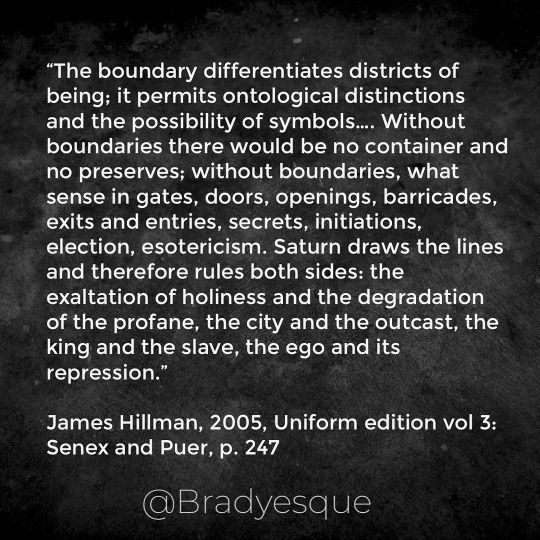
The misdirected and manipulative wielding of the psychoanalytic term “boundary” is perhaps one of my biggest pet peeves as a practicing therapist. But that’s kinda the fun of it sometimes: whenever a person describes how they define “boundary,” I get to see how they view themselves and others, how they project hostility, discern wants, acknowledge omnipotence or grandiose fantasies of control. Though, for a proper description, I turn it over to Hillman: “The boundary differentiates districts of being; it permits ontological distinctions and the possibility of symbols…. Without boundaries there would be no container and no preserves; without boundaries, what sense in gates, doors, openings, barricades, exits and entries, secrets, initiations, election, esotericism. Saturn draws the lines and therefore rules both sides: the exaltation of holiness and the degradation of the profane, the city and the outcast, the king and the slave, the ego and its repression.” James Hillman, 2005, Uniform edition vol 3: Senex and Puer, p. 247 #Psychology #Psychologist #Therapy #Therapist #Counseling #Counselor #Psychoanalysis #Psychoanalyst #Archetypal #Contemplative #LongBeach #California #PrivatePractice #Quote (at Bradyesque) https://www.instagram.com/p/Ck1heHuSp9n/?igshid=NGJjMDIxMWI=
#psychology#psychologist#therapy#therapist#counseling#counselor#psychoanalysis#psychoanalyst#archetypal#contemplative#longbeach#california#privatepractice#quote
0 notes
Photo

"It is the very same controlling dynamic that is present in, “I’ll decided if your no is a no,” that is present in, “I’ll decide if your yes is a yes.” And enthusiastic consent operates on the same problematic grounds of judging performances…. With enthusiastic consent, to give an uncertain yet trusting yes, isn’t good enough; to give a gentle yet hopeful yes, isn’t good enough; to give a small but curious yes, isn’t good enough; to give an honorable yes because the question was even asked, isn’t good enough. There is a right response and only one right response allowed when it comes to enthusiastic consent” http://bradyesque.com/on-the-problematic-aspects-of-enthusiastic-consent/ #Psychology #Psychologist #Therapy #Therapist #Counseling #Counselor #Psychoanalysis #Psychoanalyst #Archetypal #Contemplative #LongBeach #California #PrivatePractice #Quote (at Bradyesque) https://www.instagram.com/p/CkHFMVjyrBS/?igshid=NGJjMDIxMWI=
#psychology#psychologist#therapy#therapist#counseling#counselor#psychoanalysis#psychoanalyst#archetypal#contemplative#longbeach#california#privatepractice#quote
0 notes